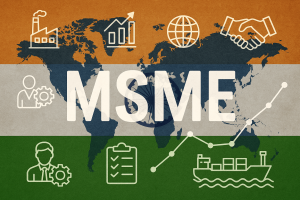Blog

Mumbai: India is looking to replicate the pro-MSME provisions seen in its recent trade agreement with the United Kingdom across upcoming deals with countries including the United States and the European Union. The aim is to create more favourable terms for Indian micro, small, and medium enterprises (MSMEs) and ensure these businesses are better positioned to compete globally.
The recent India-UK Comprehensive Economic and Trade Agreement marked a significant milestone with its dedicated chapter for MSMEs, featuring several support mechanisms. Among these are mutual contact points for MSME-related queries, simplified sharing of regulatory and certification information, and coordinated efforts to promote trade activities such as exhibitions and business networking events.
Under public procurement terms, UK suppliers bidding for Indian contracts will be classified as ‘Class-II local suppliers’ above set thresholds, whereas Indian firms, including MSMEs, retain ‘Class-I’ status, preserving their competitive edge in domestic tenders. Additionally, a technical framework has been established to help MSMEs overcome non-tariff barriers that often hinder access to international markets.
This structured support is viewed as critical for labour-intensive sectors such as textiles, footwear, leather, marine products, toys, sports goods, and jewellery – all of which depend heavily on MSME contribution. These industries have experienced a decline in export share in recent years, reinforcing the need for enhanced access to global markets. Efforts to boost these sectors are also expected to generate positive spillover effects in terms of employment and rural development.
Looking ahead, India is actively trying to incorporate similar MSME carve-outs in ongoing trade negotiations. This approach reflects a broader policy goal of ensuring trade agreements do not disproportionately benefit large firms at the expense of smaller businesses. With talks underway with key partners, there is a concerted push to include practical tools such as training modules, export readiness workshops, and joint promotion of women-led and rural MSMEs.
The Indian government is also pursuing greater collaboration in areas such as sustainability standards and technical skills development, hoping to improve the international competitiveness of domestic MSMEs. By standardising such provisions across multiple trade deals, India is attempting to build a consistent and supportive global framework for its small business sector.
As global trade dynamics evolve, India’s strategic emphasis on MSMEs signals an intent to shape agreements that not only expand market access but also strengthen the foundations of its manufacturing and export ecosystems. While challenges remain, especially with ongoing negotiations, the recent UK agreement is seen as a blueprint for future deals.
(Write to us at editorial@bombaychamber.com)








